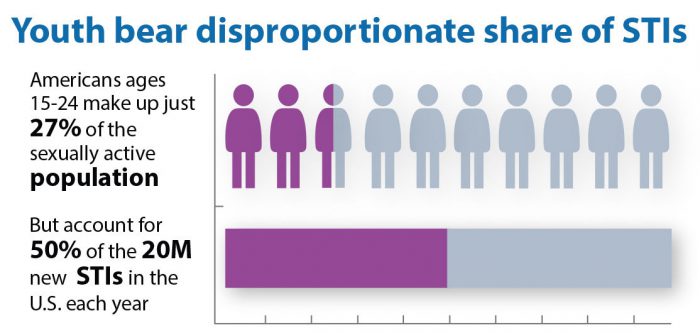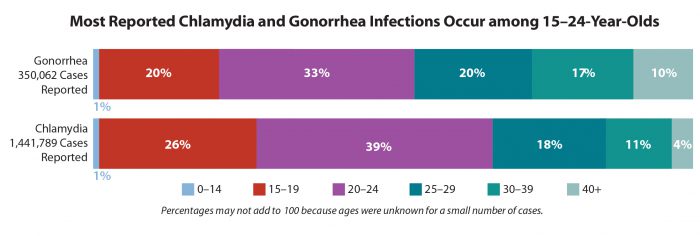On a college campus of over 40,000 students, 70 percent engage in sexual intercourse. When it comes to sexual health, some students feel that Bloomington does well at providing resources for those who want to learn more about their sexual health.
“Bloomington, as far as places in Indiana goes, are really well equipped to tell students how exactly they should go about safe sex,” an IU medical student said.
While other students disagree.
“We know about it but we don’t take the steps to really do it.” another student said.
One in two sexually active persons will contract an STI by the age of 25. Nearly 20 million new STIs occur every year in the United States, half of those among people aged 15-24.
Heather Eastman-Mueller, the Assistant director of sexual and reproductive health at the IU health center feels that the lack of knowledge about sexual health among IU students may come from abstinence-only sexual education in grades K-12.
Abstinence-only education focuses on promoting abstinence as the best way to prevent pregnancy and avoid sexually transmitted infections. However, many researchers conclude that this type of education is not realistic, nor does it provide young individuals with the necessary information they need to stay safe if they choose to engage in sexual intercourse.
“There are complete groups of people that are not even addressed in elementary school: LGBTQ individuals, relationships are all specifically looking at heterosexual and homosexual relationships,” Eastman-Mueller said.
Eastman-Mueller also blames society for having a taboo associated with talking about sexual health. Eastman-Mueller says that talking about it comprehensively and openly will educate those students who did not receive a proper sexual education in grades K-12.
Heather Eastman-Mueller talks about sexual health and STI prevention on IU’s campus.
It is important for students to educate themselves about how to stay safe during sexual intercourse. It is crucial to utilize contraception while engaging in intercourse to protect yourself from STIs and unwanted pregnancies. Some contraceptive methods may include:
- Birth control pills
- IUD
- Birth control shot
- Birth control ring
- Female condoms
- Condoms
- Dental dams
Understanding contraceptive methods and knowing which ones work the best for you and your partner is a great way to stay safe during sex.
It is also important to schedule annual visits with your physician to get tested for STIs.
It is recommended that all sexually active adults aged 13-64 get tested at least once for HIV.
Sexually active women under the age of 25 should be tested annually for chlamydia and gonorrhea. Older women who have multiple sex partners or a sexual partner who has an STI should also be tested annually.
Sexually active gay, bisexual, and other men who have sex with men should be tested annually for syphilis, chlamydia, and gonorrhea.
Physicians recommend that sexually active individuals get tested more than once a year if they have multiple partners or a partner who has a sexually transmitted infection.
If you would like to learn more about your sexual health, contraception, or get tested for STIs, visit the IU health center.


